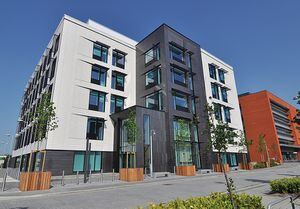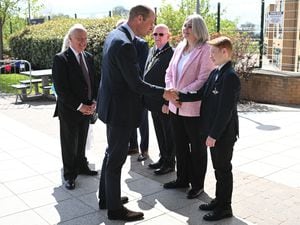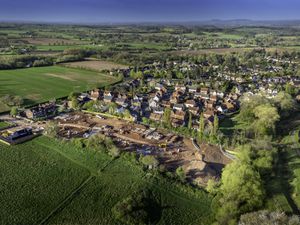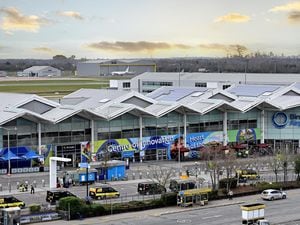Building society committed to protecting vulnerable members affected by Covid-19 crisis
The West Bromwich Building Society has set up teams to look after its vulnerable customers that have been affected by the coronavirus crisis.

The 171-year-old society, which currently has more than 5,000 borrowers taking mortgage payment holidays, is committed to looking after its more than 400,000 members through and after the crisis.
"Whether it is a short, sharp shock or a long drawn out recovery we will be around to support them through that," pledged managing director Jonathan Westhoff.
He said the West Brom – the seventh largest building society in the UK – was working hard to adjust to the ‘new normal’, adapting its ways of working across its branches and head office to adhere to government guidelines and continue to provide essential services to both existing and new members.
"Despite these challenges, as a mutual, the West Brom will continue to progress. The best interests of both our saving and borrowing members will be at the forefront of all decisions made," he stressed.
The building society, which employs just over 700, has been operating with reduced hours since March 24 and has kept open all 36 branches across the West Midlands and into Wales. It did not furlough any staff and kept all on on full pay.
The West Brom has just reported reduced pre-tax profits of £1.5 million for the financial year to the end of March after absorbing a significant impact from the potential economic consequences of the Covid-19 pandemic lockdown.
"It is not just about balance sheets – it is all about people. That drives our purpose and how we look after members is most important," explained Mr Westhoff.
"Pretty well the last thing we have looked at is profits. We needed to have the capital to make sure we were there to support our members as best we can.
"We are already supporting about 5,000 borrowers and we are now reconnecting with them to see how best we can serve them going forward," he added.
The society is still working out what the post-coronavirus future will look like and is to continue to work with members as individuals
"That has been our priority. We have focused on using our financial strength over 171 years to help our membership and now we are looking at the next generation," said Mr Westhoff.
"Over the last few years we have been developing a focus on vulnerable customers. We have set up specific teams to deal with more sensitive cases and we will have to grow those teams because of the sheer numbers that have been affected," he explained.
Mr Westhoff emphasised that the West Briom has more than double the proportion of capital strength now than it had coming through the last financial crisis.

"Although events in recent months have been unprecedented, the society is well capitalised to absorb the potential further adverse impact on the UK economy due to the pandemic.
"Despite the additional provisions made, the financial strength of the society, as measured by its Common Equity Tier 1 (CET 1) capital ratio, ended the financial year unchanged at 15.9 per cent.
"As a comparison, during the financial crisis of 2008-2009, the society’s Core Tier 1 capital ratio was 6.8 per cent. In the years since that crisis, the strategy has been to build up capital to cope with the most extreme of economic shocks."
Mr Westhoff said the West Brom had the ambition to protect people first and foremost.
"We reduced opening hours to keep branches clean and put in extra shielding and reduced staff by about half. Even in small branches we maintained good social distancing.
"We took a decision to try and reduce anxiety and promote safety and closed on Saturday mornings only
"We will start to expand opening quite soon and will soon reopen Saturdays and extend hours in the day always erring on the side of protection and safety," he added.
"What is important is looking after our members. We can play a big part in making things a little easier and making sure people stay in their homes. We have signed up to an agreement to make sure no one is removed from a house.
"There is a big uncertain future out there but our job in to do our part in minimising the impact of what comes out of this."

He explained that every year the society reviewed how appropriate its current strategy was.
"We will look at the new normal and will make sure our strategy adapts to that. Our help doesn't change - that is looking after the financial wellbeing of members and giving good rates on saving.
"I am more than proud and moreover humbled by our staff. It took my breath away how our people have pulled together. It has not just been about supporting the organisation and delivering service to customers, but the way that they have adapted to support each other and the care, concern and compassion they have shown
"Building societies are in a prime position to lead the way out of the crisis. People have concerns. They may be in furlough, on reduced pay or have an uncertain future at work and may be worrying about their mortgages or re-mortgaging or on payment holidays of up to six months and worried about the impact on future lenders.
"We are here to make people comfortable and acknowledge they should not suffer going forward for circumstances that were outside their control, Mr Westhoff stressed.
"We have enabled penalty-free early access to savings on accounts that would normally be subject to withdrawal restrictions and facilitated transfers to nominated bank accounts or trusted third parties, so any members that are self- isolating can safely access their savings.
In 2019-2020 there was £569m of new mortgage lending across an extended product range. It was a reduction from the previous year's £691m reflecting the society's strategy of only lending if it was in the best interests of its membership.
Lending to support home ownership led to a three per cent increase in owner-occupied lending balances and around 50 per cent of 3,423 new mortgages were to first-time buyers– up from 42 per cent in 2018-2019.
The society delivered savers an average rate earned on their savings some 49 per cent higher than the market average delivering £13m in total.





